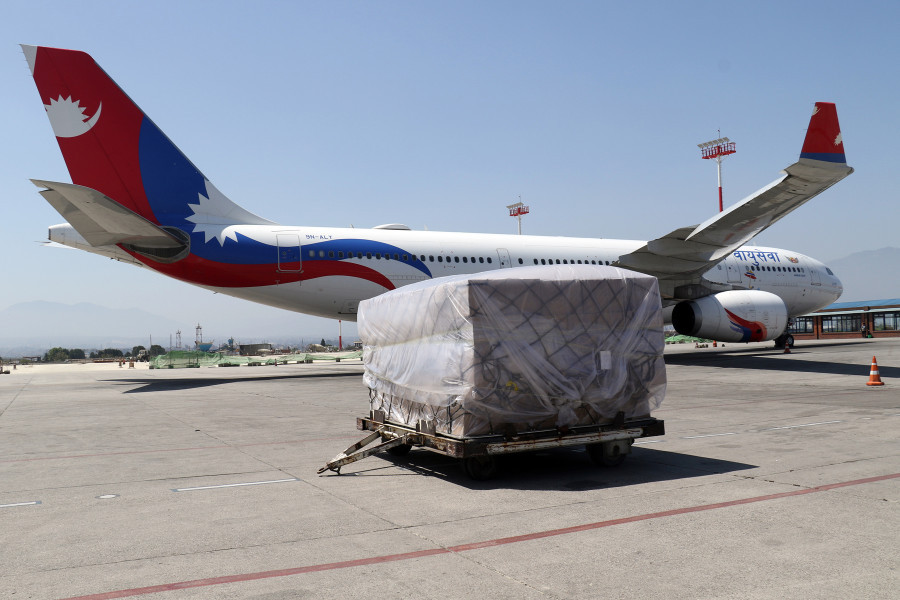National
Government yet to pay Nepal Airlines for last year’s Omni chartered flights
Payment remains stalled while the carrier faces acute financial problems due to flight suspensions.
Prithvi Man Shrestha
It has been more than 16 months since Nepal Airlines conducted a chartered flight for the Omni Business Group to ferry Covid-19-related supplies from Guangzhou, China, but the national flag carrier has not yet received the payment for the flight.
The government had chartered the flight on behalf of Omni, which was controversially awarded a contract for the delivery of medical goods despite quoting prices higher than the government’s own cost estimate and that of rival bidders.
The Department of Health Services had promised to pay the fee for the charter flight immediately after the delivery of the shipment, but that has not happened despite several follow-ups, officials at the national flag carrier said. The national flag carrier has failed to receive the payment at a time when its financial situation has deteriorated due to flight suspensions caused by the Covid-19 pandemic.
The state-owned company is supposed to receive Rs19.42 million from the government which is deductible from the bill to be paid to Omni.
“We have sent requests for the payment at least 10 times to the Department of Health Services,” said Dim Prakash Poudel, managing director of Nepal Airlines. “But, the government says that it could not make the payment as Omni has filed a case at the court against the government’s early termination of the contract.”
On April 1 last year, the department had terminated the contract with Omni after the deal signed with the company landed in controversy over alleged political influence to award the task to the company.
Earlier, the department and Omni had signed the contract on March 27 last year to deliver the medical goods worth $10.03 million in three phases.
Before the termination of the contract, Omni had supplied medical goods worth $2.33 million in the first installment on March 29 last year. The rest of the goods on order were to be delivered by April 5 the same year.
Even though the department had prepared a cost estimate of $9.07 million, it later approved the proposal of Omni, which had quoted $10.03 million, and signed an agreement inviting controversy.
After the department terminated the contract unilaterally, withholding the payment of goods brought and confiscating the bank guarantee amount, the company moved the Patan High Court, and the case is sub judice.
Unable to receive the payment, Nepal Airlines has not been able to pay the installment of loans it had borrowed from various government agencies including the Employees Provident Fund and the Citizen Investment Trust to procure wide-body and narrow-body aircraft.
“It has been more than a year that we have not paid the installment to the creditors,” said Ganesh Bahadur Chand, deputy managing director of the corporation. “How can we pay the installments when we are unable to collect the receivables?”
He said that the corporation’s liabilities to creditors have been growing rapidly due to piled-up interests. “In fact, the liabilities have surpassed the amount the government had offered as a guarantee for the loans.”
The government had offered a guarantee of Rs25 billion to the creditors to secure loans for the national flag carrier to purchase wide-body aircraft and Rs 10 billion to procure narrow-body aircraft.
The corporation had received loans totaling Rs33 billion (Rs24 billion from the Employees Provident Fund and Rs9 billion from the Citizen Investment Trust) to purchase the new planes for its international flights. But it has not been able to pay quarterly installments on the loans since January 2020. By the end of the fiscal year 2019-20, it had failed to pay Rs534 million to the creditors, according to the Annual Review of the Public Enterprises published by the Finance Ministry.
Since the beginning of the autumn travel season in October 2019, full-fare passengers had been filling its flights which pulled the company back from the brink of bankruptcy. The autumn earnings allowed the teetering national flag carrier to repay creditors breathing down its neck.
Before the Covid-19 crisis befell the airline industry, it was paying the creditors more or less regularly. “Income generated from the limited flights has been just enough to cover the administrative expenditure of the airline company,” said Chand. “We have not been generating revenue to pay the installments.” The national flag carrier employs around 1400 people.
Chand said that the payment of the stalled fee of the Omni chartered flight would give some respite to the national flag carrier during these critical times.
The pandemic hit the tourism industry and the aviation industry also suffered badly due to travel restrictions. Nepal Airlines also became a victim of travel restrictions. In the fiscal year 2019-20, it incurred a net loss of Rs3.89 billion, according to the Annual Review of the Public Enterprises published by the Finance Ministry.
Currently, it has been conducting three flights a week to New Delhi, two flights each to Dubai and Doha, and one or two to Kuala Lumpur per week. “Flights to Japan, Hong Kong, and Bangkok are not taking place,” Chand said.
According to the latest Auditor-General Report 2021, the national flag carrier could not operate flights except chartered ones from March 24 to mid-July 2020. As per a study conducted by the Nepal Airlines itself, it was supposed to lose Rs10.76 billion in the fiscal year 2019-20 owing to the pandemic.
Due to the pandemic, it had to return the early payments made by passengers for flights and it also lost the income that it used to make from ground handling at the Tribhuvan International Airport.
As international flights were slowly recovering after the first wave of the pandemic, the second wave hit the country in early April this year which affected Nepal Airlines again leading to its financial woes.
“Without the government's support, Nepal Airlines cannot survive this crisis,” said Chand.




 13.12°C Kathmandu
13.12°C Kathmandu














